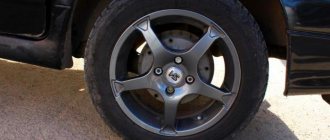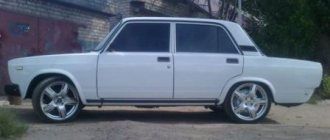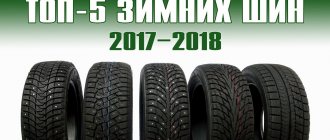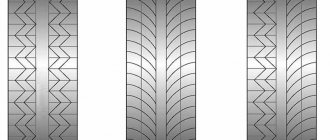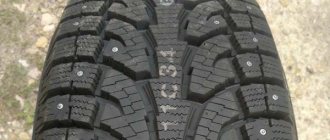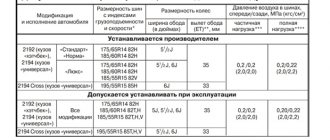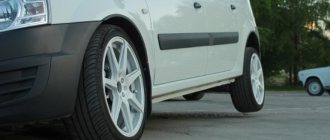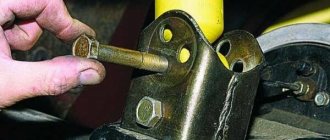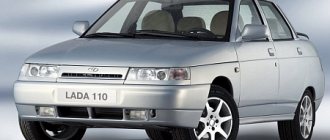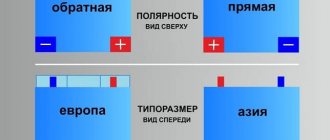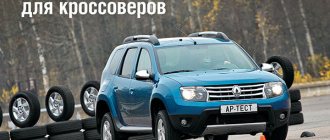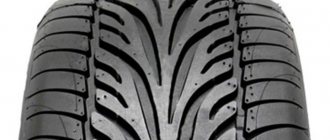Rating 2021 of the best winter tires 175/70 R13, studded and non-studded (Velcro), according to independent experts. Summary technical characteristics of tires, price comparison in online stores in your city.
| Number | Name | Rating |
| Winter tires Michelin 175/70 R13 | ||
| 1 | MICHELIN Maxi Ice | Average price: 2230 rub. |
| Winter tires Yokohama 175/70 R13 | ||
| 1 | Yokohama Ice Guard IG50+ | Average price: 4780 rub. |
| 2 | Yokohama Ice Guard IG35+ | Average price: 11,070 rub. |
| Winter tires Goodyear 175/70 R13 | ||
| 1 | GOODYEAR Ultra Grip 500 | Average price: 51165 rub. |
| 2 | GOODYEAR Ultra Grip Ice | Average price: 7960 rub. |
| Winter tires Viatti 175/70 R13 | ||
| 1 | Viatti Brina Nordico V-522 | Average price: 3058 rub. |
| 2 | Viatti Brina V-521 | Average price: 2814 rub. |
| Winter tires Nokian 175/70 R13 | ||
| 1 | Nokian Tires Nordman 7 studded | Average price: 4870 rub. |
| 2 | Nokian Tires Nordman 5 studded | Average price: 2750 rub. |
| 3 | Nokian Tires Hakkapeliitta 4 studded | Average price: 3450 rub. |
| 4 | Nokian Tires Hakkapeliitta 2 studded | Average price: 10,200 rub. |
| Winter tires KAMA Euro 175/70 R13 | ||
| 1 | KAMA Kama-505 | Average price: 2070 rub. |
| Winter tires Hankook 175/70 R13 | ||
| 1 | Hankook Tire Winter i*Pike RS2 W429 studded | Average price: 5200 rub. |
| 2 | Hankook Tire Winter i*Cept iZ 2 W616 | Average price: 6090 rub. |
| 3 | Hankook Tire Winter i*Pike RS W419 | Average price: 6300 rub. |
| 4 | Hankook Tire Zovac HP W401 studded | Average price: 4050 rub. |
| Winter tires Kumho 175/70 R13 | ||
| 1 | Kumho KW7400 | Average price: 2433 rub. |
| Winter tires Triangle 175/70 R13 | ||
| 1 | Triangle TR777 | Average price: 4200 rub. |
| Winter tires Toyo 175/70 R13 | ||
| 1 | Toyo OBSERVE GSi-5 | Average price: 7490 rub. |
| 2 | Toyo OBSERVE G3-ICE | Average price: 8560 rub. |
| 3 | Toyo Observe G2S studded | Average price: 3950 rub. |
| 4 | Toyo Observe Garit GIZ | Average price: 4040 rub. |
| Winter tires Tigar 175/70 R13 | ||
| 1 | Tigar WINTER 1 | Average price: 2490 rub. |
| Winter tires Bridgestone 175/70 R13 | ||
| 1 | Bridgestone Blizzak SPIKE-02 | Average price: 8840 rub. |
| 2 | Bridgestone Blizzak ICE | Average price: 9570 rub. |
| Winter tires Formula 175/70 R13 | ||
| 1 | Formula Ice | Average price: 4997 rub. |
| Winter tires Maxxis 175/70 R13 | ||
| 1 | MAXXIS NP5 Premitra Ice Nord studded | Average price: 3849 rub. |
| 2 | MAXXIS Arctic Trekker SP03 | Average price: 3120 rub. |
| Winter tires Dunlop 175/70 R13 | ||
| 1 | Dunlop WINTER MAXX WM02 | Average price: 6700 rub. |
| Winter tires Nexen 175/70 R13 | ||
| 1 | Nexen Winguard Snow G WH2 | Average price: 3720 rub. |
Winter tires Yokohama 175/70 R13
Yokohama Ice Guard IG50+
- Speed index:
Q (up to 160 km/h) - Spikes:
no - Diameter:
12 / 13 / 14 / 15 / 16 / 17 / 18 / 19 - Profile width:
135 / 145 / 155 / 165 / 175 / 185 / 195 / 205 / 215 / 225 / 235 / 245 / 255 / 265 - Profile height:
35 / 40 / 45 / 50 / 55 / 60 / 65 / 70 / 80 - Rating:
4.5
Advantages:
- acceptable price
- low noise level
- fuel economy
- controllability
Flaws:
- grip in warm weather
175/70 R13
Yokohama Ice Guard IG35+
- Speed index:
T (up to 190 km/h) - Spikes:
yes - Diameter:
13 / 14 / 15 / 16 / 17 / 18 / 19 / 20 / 21 / 22 - Profile width:
145 / 175 / 185 / 195 / 205 / 215 / 225 / 235 / 245 / 255 / 265 / 275 / 285 / 295 / 325 - Profile height:
30 / 35 / 40 / 45 / 50 / 55 / 60 / 65 / 70 / 75 - Rating:
4.5
Advantages:
- holds the road well
- Very strong cord
- Doesn't lose thorns
- soft
- Excellent paddling in deep, loose snow
Flaws:
- tires are slippery on ice
- no directional stability
175/70 R13
Winter tires for R14 - a selection of the best tire models for 14
Instead of an epilogue
14-inch tires, as a rule, fit wheels of small diameters, not only on cheap cars produced by foreign manufacturers, but also on Russian cars.
And if 14th tire diameter is what your “swallow” needs and you are choosing the best tires for driving in the autumn-winter period, we will try to help you in this matter.
And although our rating of 14-inch tires for driving on ice and snow does not claim to be the ultimate truth, nevertheless, we hope it will be of interest to many car owners. After all, in it we tried to collect all brands of tires that have proven themselves to be as good as possible during testing, and have received the highest ratings not only from specialists, but from ordinary car owners.
Winter tires Goodyear 175/70 R13
GOODYEAR Ultra Grip 500
- Speed index:
H (up to 210 km/h) / Q (up to 160 km/h) / T (up to 190 km/h) - Spikes:
optional - Diameter:
13 / 14 / 15 / 16 / 17 / 18 / 19 / 20 - Profile width:
155 / 165 / 175 / 185 / 195 / 205 / 215 / 225 / 235 / 245 / 255 / 265 / 275 - Profile height:
40 / 45 / 50 / 55 / 60 / 65 / 70 / 75 - Rating:
4.5
175/70 R13
GOODYEAR Ultra Grip Ice
- Speed index:
Q (up to 160 km/h) / S (up to 180 km/h) / T (up to 190 km/h) - Spikes:
no - Diameter:
13 / 14 / 15 / 16 / 17 / 18 / 19 - Profile width:
175 / 185 / 195 / 205 / 215 / 225 / 235 / 245 / 255 / 265 - Profile height:
45 / 50 / 55 / 60 / 65 / 70 - Rating:
4.5
175/70 R13
Conclusion
There can be long and fruitless debates about which winter tires are best to buy. Every opinion on this matter will ultimately come down to personal experience of use. However, in conclusion, car owners should be reminded of the need to use winter tires in a timely manner. During the cold season, traffic on the roads becomes many times more dangerous than in the summer season. The safety of all road users and passengers is the driver’s main task, so you should approach the choice of winter tires with full responsibility.
Recently, choosing the best winter tires based only on ratings compiled by popular magazines has become illogical, since the experience of car enthusiasts often contradicts the results of such tests. For Russian motorists, referring to the ratings of the famous German magazine ADAC becomes completely irrelevant, since the use of studs is prohibited in Europe, and all the friction tires they tested were created for the mild European winter. We tried to compile our rating of winter tires based on the popularity of tires, reviews from motorists, and studying the strengths and weaknesses of these tires.
Russians often face the question: should they buy studded or non-studded (friction) tires, simply “Velcro”? There are many adherents of one type or another. We do not set a goal to convince anyone, and therefore we will consider the best friction and studded winter tires offered to the Russian consumer.
| Category | Place | Name | Rating | Price |
| The best winter non-studded tires | 1 | Nokian Hakkapeliitta R2 SUV | 9.8 / 10 | 5 734 |
| 2 | MICHELIN Pilot Alpin 5 | 9.7 / 10 | 7 720 | |
| 3 | Goodyear Ultra Grip Ice 2 | 9.6 / 10 | 7 647 | |
| 4 | Bridgestone Blizzak Ice | 9.5 / 10 | 9 820 | |
| 5 | Yokohama Ice Guard IG60 | 9.4 / 10 | 3 500 | |
| 6 | Nokian Nordman RS | 9.4 / 10 | 3 250 | |
| 7 | Continental ContiViking Contact 6 | 9.3 / 10 | 8 960 | |
| The best winter studded tires | 1 | MICHELIN X-Ice North | 9.8 / 10 | 8 618 |
| 2 | Nokian Hakkapeliitta 8 SUV | 9.8 / 10 | 11 820 | |
| 3 | Dunlop Grandtrek Ice02 | 9.7 / 10 | 8 720 | |
| 4 | Goodyear Ultra Grip Ice Arctic | 9.7 / 10 | 8 050 | |
| 5 | Continental IceContact 2 | 9.7 / 10 | 4 700 | |
| 6 | Gislaved Nord Frost 200 | 9.6 / 10 | 4 000 | |
| 7 | Pirelli Ice Zero | 9.6 / 10 | 10 374 | |
| 8 | Bridgestone Ice Cruiser 7000 | 9.5 / 10 | 7 968 |
Winter tires Viatti 175/70 R13
Viatti Brina Nordico V-522
- Speed index:
T (up to 190 km/h) - Spikes:
yes - Diameter:
13 / 14 / 15 / 16 / 17 / 18 - Profile width:
175 / 185 / 195 / 205 / 215 / 225 / 235 / 245 / 255 / 265 - Profile height:
40 / 45 / 50 / 55 / 60 / 65 / 70 / 75 - Rating:
4.5
Advantages:
- price
- traction in “dog” winters
- low noise
Flaws:
- in near-zero temperatures they don’t hold the road so well
Show prices
Viatti Brina V-521
- Speed index:
Q (up to 160 km/h) / R (up to 170 km/h) / T (up to 190 km/h) - Spikes:
no - Diameter:
13 / 14 / 15 / 16 / 17 / 18 - Profile width:
175 / 185 / 195 / 205 / 215 / 225 / 235 / 245 / 255 - Profile height:
40 / 45 / 50 / 55 / 60 / 65 / 70 / 75 / 80 - Rating:
4.5
Advantages:
- grip quality is on par
- There is practically no noise after studded
- rolls very well on both loose and compacted snow, is not afraid of impacts
- quite durable
- reasonable price
Flaws:
- behavior on ice
Show prices
Budget segment
The top 10 among budget winter tires included representatives of different companies. Some are well known to car owners, others are not. But all these tires have managed to gain quite a bit of popularity and increase their level of credibility during the time they have been on the market. Look at the top, study the tires offered for the winter and decide for yourself which manufacturer’s products will be more profitable and correct for you to choose. Let's start from the top outsiders and gradually come to the best solution. If you wish, you can compare these winter tires and try to determine which tire is better.
- MA STL. Products of the Chinese company Maxxis. If someone compared the quality of these tires with other representatives of the rating, then the Chinese are unlikely to win. But the main advantage of the model is its low price. At the same time, the tires perform well in snow conditions. The composition is not the softest, which creates additional noise during movement. Braking and acceleration are standard, nothing special should be expected.
- Snowprox S941. The developer is Toyo. Well-known company with a good reputation. This tire model is budget, aimed at middle-class cars. The tires easily overcome slush and slush and cope well with snowy roads. Due to the inclusion of silicone, the rubber remains soft, and therefore does not hum or create unnecessary noise.
- KrisAlp HP. Its developer is the company Kleber. Not the most famous company, but in fact it is a subsidiary of Michelin. Therefore, it borrows technologies and materials from it, which has a positive effect on the final quality of the tires. This model is aimed at high-power cars
All presented tires are offered at prices up to 3 thousand rubles. This allows us to confidently classify them as budget winter tires. So the concepts of cheap and poor quality are not always comparable. There are excellent tires for little money that will ensure you can confidently overcome snowy and icy roads.
Winter tires Nokian 175/70 R13
Nokian Tires Nordman 7 studded
- Speed index:
T (up to 190 km/h) - Spikes:
yes - Diameter:
13 / 14 / 15 / 16 / 17 - Profile width:
155 / 165 / 175 / 185 / 195 / 205 / 215 / 225 / 235 / 245 - Profile height:
45 / 50 / 55 / 60 / 65 / 70 / 80 - Rating:
4.5
Show prices
Nokian Tires Nordman 5 studded
- Speed index:
T (up to 190 km/h) - Spikes:
yes - Diameter:
13 / 14 / 15 / 16 / 17 / 18 - Profile width:
155 / 165 / 175 / 185 / 195 / 205 / 215 / 225 / 235 / 245 / 255 / 265 / 275 - Profile height:
45 / 50 / 55 / 60 / 65 / 70 / 75 - Rating:
4.5
Show prices
Nokian Tires Hakkapeliitta 4 studded
- Speed index:
T (up to 190 km/h) - Spikes:
yes - Diameter:
13 / 14 / 15 / 16 / 17 / 18 / 20 - Profile width:
165 / 175 / 185 / 195 / 205 / 215 / 225 / 235 / 245 / 275 - Profile height:
40 / 45 / 50 / 55 / 60 / 65 / 70 - Rating:
4.5
Show prices
Nokian Tires Hakkapeliitta 2 studded
- Speed index:
Q (up to 160 km/h) / R (up to 170 km/h) / T (up to 190 km/h) - Spikes:
yes - Diameter:
13 / 14 / 15 / 16 / 17 / 18 - Profile width:
145 / 155 / 165 / 175 / 185 / 195 / 205 / 215 / 225 / 235 / 245 / 255 / 265 - Profile height:
45 / 50 / 55 / 60 / 65 / 70 / 75 / 80 / 85 - Rating:
4.5
Show prices
Winter tires KAMA Euro 175/70 R13
KAMA Kama-505
- Speed index:
Q (up to 160 km/h) / T (up to 190 km/h) - Spikes:
yes - Diameter:
13 / 14 / 15 - Profile width:
175 / 185 / 195 - Profile height:
60 / 65 / 70 - Rating:
4.5
Advantages:
- inexpensive
- Holds well
- Rows well
- balanced perfectly
Flaws:
- a lot of spikes fell out after season 1
- Noisy
Show prices
Winter tires Hankook 175/70 R13
Hankook Tire Winter i*Pike RS2 W429 studded
- Speed index:
T (up to 190 km/h) - Spikes:
yes - Diameter:
13 / 14 / 15 / 16 / 17 / 18 / 19 - Profile width:
155 / 165 / 175 / 185 / 195 / 205 / 215 / 225 / 235 / 245 / 255 - Profile height:
40 / 45 / 50 / 55 / 60 / 65 / 70 / 80 - Rating:
4.5
Show prices
Hankook Tire Winter i*Cept iZ 2 W616
- Speed index:
T (up to 190 km/h) - Spikes:
no - Diameter:
13 / 14 / 15 / 16 / 17 / 18 / 19 - Profile width:
155 / 175 / 185 / 195 / 205 / 215 / 225 / 235 / 245 / 255 - Profile height:
35 / 40 / 45 / 50 / 55 / 60 / 65 / 70 - Rating:
4.5
Advantages:
- tire
- price
- slow wear
- perfect grip on dry asphalt
Flaws:
- soft rubber
- at 0+ it floats
Show prices
Hankook Tire Winter i*Pike RS W419
- Speed index:
T (up to 190 km/h) - Spikes:
yes - Diameter:
13 / 14 / 15 / 16 / 17 / 18 / 19 - Profile width:
155 / 165 / 175 / 185 / 195 / 205 / 215 / 225 / 235 / 245 / 255 - Profile height:
40 / 45 / 50 / 55 / 60 / 65 / 70 / 75 - Rating:
4.5
Advantages:
- soft
- excellent grip on ice
- does not buzz or make noise
- price
- strong sidewall
- well balanced
Flaws:
- rutting
Show prices
Hankook Tire Zovac HP W401 studded
- Speed index:
P (up to 150 km/h) / Q (up to 160 km/h) / S (up to 180 km/h) / T (up to 190 km/h) - Spikes:
yes - Diameter:
12 / 13 / 14 / 15 / 16 - Profile width:
145 / 155 / 165 / 175 / 185 / 195 / 205 / 215 / 225 / 235 - Profile height:
55 / 60 / 65 / 70 / 75 / 80 - Rating:
4.5
Show prices
Video - how to choose winter tires
The choice of tires for car owners is an important and responsible undertaking. Safety on the road, stability and ability to perform the necessary maneuvers largely depend on them. Winter tires have more responsibilities, since in one season they must ensure the ability to operate the car in different conditions. During the cold season, the weather can change quickly, so tire manufacturers try to make tires that can move on snow, ice, dry asphalt, puddles, slush and more. The rating of winter tires must include representatives of all price segments. Not everyone can afford to purchase a premium group kit, and not all cars need it. Considering this rating, everyone will be able to choose the optimal set of wheels from proven and well-established manufacturers.
TOP of the best winter tires in different price ranges.
Winter tires Kumho 175/70 R13
Kumho KW7400
- Speed index:
H (up to 210 km/h) / Q (up to 160 km/h) / S (up to 180 km/h) / T (up to 190 km/h) - Spikes:
no - Diameter:
13 / 14 / 15 - Profile width:
135 / 145 / 155 / 165 / 175 / 185 / 195 - Profile height:
60 / 65 / 70 / 80 - Rating:
4.5
Advantages:
- provide excellent braking on all types of surfaces in all weather conditions
- No side slip
- braking is smooth and smooth
- They don't make noise
- Strong sidewall
- moderately soft rubber compound
- the tire does not crack
- does not “stubble” in the cold
Flaws:
- No
Show prices
Rating of winter tires for VAZ: recommendations for choosing
Any motorist should be extremely responsible when selecting and purchasing tires. Especially when it comes to winter kit. Often, people's lives depend on the behavior of the iron horse when riding in the cold season.
Cars produced at AvtoVAZ are still very common in the post-Soviet space. Therefore, the question of which winter tires are best to choose for installation on cars of this brand is still relevant.
Winter tires Triangle 175/70 R13
Triangle TR777
- Speed index:
H (up to 210 km/h) / Q (up to 160 km/h) / S (up to 180 km/h) / T (up to 190 km/h) / V (up to 240 km/h) - Spikes:
no - Diameter:
13 / 14 / 15 / 16 / 17 / 18 / 19 - Profile width:
155 / 165 / 175 / 185 / 195 / 205 / 215 / 225 / 235 / 245 / 255 - Profile height:
45 / 50 / 55 / 60 / 65 / 70 / 75 - Rating:
4.5
Advantages:
- soft
- quiet
- rows perfectly
- price
Flaws:
- difficult to balance
Show prices
Winter tires Toyo 175/70 R13
Toyo OBSERVE GSi-5
- Speed index:
H (up to 210 km/h) / N (up to 140 km/h) / Q (up to 160 km/h) / S (up to 180 km/h) / T (up to 190 km/h) - Spikes:
no - Diameter:
13 / 14 / 15 / 16 / 17 / 18 / 19 / 20 / 21 / 22 - Profile width:
145 / 155 / 175 / 185 / 195 / 205 / 215 / 225 / 235 / 245 / 255 / 265 / 275 / 285 / 295 / 315 - Profile height:
35 / 40 / 45 / 50 / 55 / 60 / 65 / 70 / 75 / 80 - Rating:
4.5
Advantages:
- holds up well on loose snow
- predictable on packed snow
- Holds up perfectly on dry asphalt at sub-zero temperatures
- Hard sidewall but soft tread
Flaws:
- doesn't like road markings
- very soft when turning and temperatures 0…+5
- ABS works constantly in wet snow and slushy conditions
Show prices
Toyo OBSERVE G3-ICE
- Speed index:
H (up to 210 km/h) / Q (up to 160 km/h) / T (up to 190 km/h) / Y (up to 300 km/h) - Spikes:
no - Diameter:
13 / 14 / 15 / 16 / 17 / 18 / 19 / 20 / 21 / 22 - Profile width:
175 / 185 / 195 / 205 / 215 / 225 / 235 / 245 / 255 / 265 / 275 / 285 / 295 / 315 / 325 - Profile height:
30 / 35 / 40 / 45 / 50 / 55 / 60 / 65 / 70 / 75 - Rating:
4.5
Advantages:
- holds the road well
- Rowing and slowing down everywhere
- Adequate noise level for spikes
- price
Flaws:
- No
Show prices
Toyo Observe G2S studded
- Speed index:
H (up to 210 km/h) / T (up to 190 km/h) - Spikes:
yes - Diameter:
13 / 14 / 15 / 16 / 17 / 18 - Profile width:
175 / 185 / 195 / 205 / 215 / 225 - Profile height:
45 / 50 / 55 / 60 / 65 / 70 - Rating:
4.5
Show prices
Toyo Observe Garit GIZ
- Speed index:
Q (up to 160 km/h) - Spikes:
no - Diameter:
13 / 14 / 15 / 16 / 17 / 18 - Profile width:
145 / 155 / 165 / 175 / 185 / 195 / 205 / 215 / 225 / 235 / 245 - Profile height:
45 / 50 / 55 / 60 / 65 / 70 / 80 - Rating:
4.5
Advantages:
- price
- good quality
- well balanced
- quiet
- performs well at sub-zero temperatures on dry and snowy asphalt
- goes well on loose snow
- controlled
- not afraid of ruts
Flaws:
- on ice the ABS kicks in and blows away
- Very soft
- rolling
- floats a little
Show prices
The best winter studded tires
A deep directional tread is exactly what most buyers of winter studs are looking for. However, X-Ice North is still more of a rubber for those who “know how to use it.” First of all, due to the fact that here the manufacturer used a traditionally soft compound (which can already be considered a proprietary feature of Michelin) - as a result, the rubber really clings to the asphalt in the cold, does not harden, and the tread is easily self-cleaning. But as soon as it gets warmer, the rubber will become too soft - and this will lead to problems when maneuvering and loss of studs. So if your visits to a tire shop begin with the thoughts “well, it’s time to change your shoes, or something,” then these tires will not be the best choice. But if you install and remove it on time, and the winter in your area is traditionally cold and snowy, then X-Ice North will reveal all its strengths in the best possible way.
Of course, the specific, and even studded, tread cannot boast of acoustic comfort, especially on new tires. After running in, the wheels will become quieter, but it will not be possible to completely get rid of the noise, and closer to spring it will become noticeably stronger (by the way, this in itself is a good indicator of excessive softening of the rubber).
- Excellent behavior in the snow
- Frost resistance
- Sharp softening during warming: do not delay your visit to the tire shop in the spring
An improved version of the previous model, reinforced with aramid fibers. The tire is designed for harsh winters. Wide range of sizes from 15 to 21 inches. Requires running-in, after which it acquires all the advantages described below. Winner of the studded tire test of the Autoreview and Za Rulem magazines, conducted in 2014.
- exemplary grip on both snow and ice;
- reinforced sidewall;
- confident braking on dry asphalt;
- good handling in all weather conditions;
- minimal wear;
- quite quiet and comfortable;
- the thorns do not fly out;
- brilliantly removes water and slush.
- high price;
- difficult to keep track;
- before running in there is a slight hum;
- requires balancing.
The complex mid-tread pattern (close to what you see on AllTerrain tires) and the developed shoulder area definitely indicate some off-road potential of the rubber. In practice, it really turned out to be a good option for crossovers and all-wheel drive station wagons like the Subaru Forester - the tires are quite adequate in snowy ruts, the firmly embedded studs grip the ice well, so you can actually drive off the asphalt on it.
The other side of the coin is the high level of noise on the asphalt - at least for the first thousand kilometers it will seriously annoy you until the tires break in.
At a not very high price, it was nice to see a thoughtful approach to creation - the tread itself is two-layer, the outer soft layer is responsible for grip, the inner hard one is for strength, and the bases of the studs are attached to it. The studs themselves are composite, with a lightweight aluminum body and a tungsten carbide tip, which guarantees them high wear resistance. However, you should not abuse sudden starts when the ice is gone: these spikes “plow” the asphalt deeply.
- Confident behavior off the pavement
- Good stability on hard surfaces
- Reliable spikes
- High noise level during run-in
The old Scandinavian company, founded at the end of the 19th century, and now owned by the German Continental AG and producing products for the Russian market in Kaluga, enjoys well-deserved authority in the field of creating studded tires. Winter tires Nord Frost 200 are not new on our market, but this does not mean that the tires are not able to compete on equal terms with eminent competitors. In addition, the work of Continental marketers is also having an impact - in fact, the new Gislavedas repeat the design solutions of the tires of this brand, used several years earlier, but at the same time the price is lower. If two years ago you were licking your lips at Continental tires, but Toad defeated Hamster with his favorite choke hold, look towards Gislaved today. It’s not for nothing that the tread pattern is confusingly similar to the old IceContact.
The rubber is moderately noisy, despite the studs and deep tread. If earlier on the “hundredth” series it was symmetrical, now the pattern has become more complex, retaining the pronounced sweep of the central grooves, but improving the car’s handling due to the modified design of the outer shoulder. Well, the unusual Tri-Star studs, developed by the Finnish company Tikka (not to be confused with the manufacturer of high-end hunting rifles of the same name), are indeed not only quieter than usual, but also stay firmly in the tread.
Rubber, and especially the sidewalls, are soft, and this must be taken into account when driving - the risk of damage is high if you fall into a deep pothole on the asphalt at speed or rub sideways into curb stones. The tread pattern on narrow, small-diameter tires works averagely – there is a pronounced tendency to clog, but when “scaled” to sizes typical for SUVs and crossovers, it starts to work as it should.
Winter tires Tigar 175/70 R13
Tigar WINTER 1
- Speed index:
H (up to 210 km/h) / Q (up to 160 km/h) / T (up to 190 km/h) / V (up to 240 km/h) / W (up to 270 km/h) - Spikes:
no - Diameter:
13 / 14 / 15 / 16 / 17 / 18 - Profile width:
145 / 155 / 165 / 175 / 185 / 195 / 205 / 215 / 225 / 235 / 245 - Profile height:
40 / 45 / 50 / 55 / 60 / 65 / 70 / 80 - Rating:
4.5
Advantages:
- very quiet
- soft rubber
- behaves well on snowy roads
- Lekgo gets out of the icy rut
- good handling
- price-quality ratio
Flaws:
- not very grippy on ice
- soft sides
Show prices
How are winter tires different from summer tires?
It's no secret that even today there are vehicle owners who do not change tires for the winter. For a number of reasons: due to lack of money, time or laziness.
Various excuses are being made:
- mild climate;
- rare trips in winter;
- The car has all-season tires, that's enough.
Some people cannot correctly calculate the time to change tires, postponing this operation until the last minute. All this dramatically increases the accident rate on our roads.
Why is it important to take seriously driving a car in the cold season and timely installation of winter tires?
When producing tires for each season, special rubber compounds are used, so that the tires receive the performance characteristics that are necessary for their use in certain temperature ranges. This is explained by the fact that the properties of rubber, especially its elasticity, are directly related to the ambient temperature.
Summer tires are made from a material whose properties change at temperatures of about 4...7 degrees above zero. With negative values on the thermometer, the efficiency of tires sharply decreases due to deterioration in ductility and adhesion to the road surface. On stiff wheels, acceleration and braking are fraught with dire consequences. It should be noted that summer tires are much harder than winter tires.
The main difference between winter tires and their summer counterparts is not at all in the depth and type of tread (although it is rougher and deeper), but in the properties of the rubber itself, which is elastic in the cold and provides good grip.
Studded tires, which improve traction in certain situations, make sense if you often have to drive on country roads in winter. On the ice they behave much more confidently.
Important! Winter tires wear out much faster when used in summer.
On all-season tires you can drive at temperatures not lower than -7 degrees. And, if you compare their characteristics with the properties of winter tires, they definitely lose: the braking distance is longer, and the handling is worse.
As one might understand, there are no universal tires that can be used to travel at negative and positive temperatures. Therefore, if a car owner is responsible for his life, the safety of loved ones and other road users, it is necessary in time (before the onset of the first frost) to consider the issue of changing tires.
Important! Tires are replaced if their tread depth becomes less than 4 mm.
Winter tires Bridgestone 175/70 R13
Bridgestone Blizzak SPIKE-02
- Speed index:
T (up to 190 km/h) - Spikes:
yes - Diameter:
13 / 14 / 15 / 16 / 17 / 18 / 19 / 20 - Profile width:
175 / 185 / 195 / 205 / 215 / 225 / 235 / 245 / 255 / 265 / 275 / 285 - Profile height:
40 / 45 / 50 / 55 / 60 / 65 / 70 - Rating:
4.5
Advantages:
- strong and reliable tire
- clutch
- brand
- braking
Flaws:
- noise
Show prices
Bridgestone Blizzak ICE
- Speed index:
S (up to 180 km/h) - Spikes:
no - Diameter:
13 / 14 / 15 / 16 / 17 / 18 / 19 - Profile width:
175 / 185 / 195 / 205 / 215 / 225 / 235 / 245 / 255 - Profile height:
40 / 45 / 50 / 55 / 60 / 65 / 70 - Rating:
4.5
Advantages:
- controllability in any modes
- braking on ice and snow
- silent
- price
Flaws:
- I feel a bit of a rut
Show prices
Middle class
Now about the rating of the best winter tires of 2021, which represent the middle price segment. These are mainly representatives of leading tire manufacturers. You yourself must choose which winter tires would be best to buy in your particular case. All presented tires combine excellent quality and good prices. You can’t call them cheap, but they don’t reach the premium segment either. Their price varies from 2.5 to 4 thousand rubles per wheel on average. This price will satisfy most car owners who need a set of high-quality winter tires.
The rating includes 8 models. It is difficult to award them a specific place in the top, since they are at approximately the same level.
- Winter Contact TS 860. Winter tires from Continental. They performed excellently in special braking tests on snow, wet and dry asphalt. The level of comfort and sound insulation is excellent. Many call this model the best solution for an average price among all other representatives of the rating.
- WR D4. Here they came up with a simpler and more concise name. The developer is Nokian. The most affordable tire among the options presented. Performs well in snow and wet surfaces. Comfort is not exemplary, but not bad.
- Cinturato Winter. Product of Pirelli. Although the tires are not the cheapest, due to their excellent behavior on dry and snowy surfaces they deserve a place in this rating. The optimal choice for regions with moderate winters.
- Ultra Grip Gen 1. An excellent tire from Goodyear. The most expensive representative of the rating. Performs well on wet and dry surfaces.
- Alpin 5. A solution from Michelin that has proven itself to be the best when traversing snowy areas. The efficiency of passing dry and wet asphalt is slightly lower. The noise level does not allow it to be among the best.
- Blizzak LM001. Fairly cheap tire from Br />
Some of the presented tires could be included in the premium segment rating. But there were obvious leaders there. Many will agree that for most car owners the middle class will be the most preferable. There are still many questions regarding budget tires, and not everyone can afford the most expensive solutions.
Winter tires Formula 175/70 R13
Formula Ice
- Speed index:
T (up to 190 km/h) - Spikes:
no - Diameter:
13 /14 /15 /16 /17 /18 - Profile width:
175 / 185/ 195/ 205/ 215/ 225/ 235/ 245/ 265 - Profile height:
45 / 50 / 55 / 60/ 65 / 70 / 75 - Rating:
4.5
Advantages:
- price
- good handling
- confident braking
- works great on wet asphalt
- drives great in the snow
- soft
- easily balanced
Flaws:
- a bit noisy
- track
- speed over 140km/h
Show prices
TOP-5 14″ tires with studs for winter
So, our top five winter R14s are as follows:
- Continental IceContact 2
- Bridgestone Blizzak Spike-02
- Nokian Hakkapeliitta 8
- Goodyear UltraGrip Ice Arctic
- BFGoodrich g-Force Stud
Now, let's go through each of these top tire brands.
Continental IceContact 2
Continental IceContact 2
This brand of winter tires deserves a place in our ranking thanks to its excellent performance during test runs.
And all because the tread pattern of this tire has more studs planted on the tire using StudOn Retention Technology.
In addition, the design of these tires provides for the presence of special pockets into which crushed ice is instantly removed from the base of the metal insert.
And the asymmetrical tread pattern makes the Continental IceContact 2 tires extremely maneuverable and very quiet when the car is moving.
Advantages
:
- excellent level of controllability;
- excellent braking on snowy or icy road surfaces;
- almost no noise when driving.
Flaws
:
- average level of cross-country ability;
- slightly overpriced.
Read reviews
Bridgestone Blizzak Spike-02
Bridgestone Blizzak Spike-02
And these tires for winter roads come from Japan. And they can boast of having on their surface a directional pattern applied to the tread, which has many times more lamellas.
And due to the fact that more silica was added to this rubber, tires made from it do not lose their elastic properties even in severe frosts. And due to the presence of reinforced shoulder areas, these tires are also much better at holding the car on the road when cornering.
Advantages
:
- “iron” brakes on icy and snowy road surfaces;
- increased level of cross-country ability;
- reinforced tire sidewalls;
- Wear-resistant spikes.
Flaws
:
- increased noise level when the vehicle is moving;
- poor performance when driving and braking on a road surface with a layer of slush on top.
Nokian Hakkapeliitta 8
Nokian Hakkapeliitta 8
The unique feature of these studded tires and their Finnish soul is the special pattern on their treads. It contains hidden 3D sipes, which guarantee the car an excellent level of maneuverability when cornering.
In addition, due to the unique composition of the compound and the presence of a breaker package, these tires firmly hold the car on uneven road surfaces, while significantly reducing the noise level when driving.
Advantages
:
- instant start and the same stop on snowy and icy roads;
- significant fuel savings;
- absence of annoying noise when the car is moving;
- excellent level of vehicle maneuverability;
- excellent vehicle cross-country ability.
Flaws
:
- not ideal braking on asphalt roads;
- These tires are somewhat overpriced.
Goodyear UltraGrip Ice Arctic
Nokian Hakkapeliitta 8
These winter tires feature unique studs made using MultiControl Ice technology. It helps the tires maintain maximum contact with the road surface.
And their extended “shoulders” provide an increased level of cross-country ability. As for the large number of notches and edges on the treads of these tires, they are designed to grip the tires to the road as reliably as possible.
In addition, this model of winter tires is equipped with specialized recesses for instant drainage of liquid formed from snow. And the compound contains silicon particles, which improve the process of stopping (braking) the car.
Advantages
:
- excellent level of grip on snowy road surfaces;
- instant start and the same stop on any type of road;
- excellent cross-country ability;
- significant fuel savings.
Flaws
:
- poor vehicle maneuverability on icy roads;
- There are problems with the noise level when driving, as well as with the smoothness of the car.
BFGoodrich g-Force Stud
BFGoodrich g-Force Stud
These tires have studs placed very tightly over the entire surface. And this provides an excellent level of grip on the road surface.
In addition, such tires are equipped with a system of channels in the “shoulder” area. They will help the tires quickly clean themselves. The groove located in the central part of the tire has an increased depth and effectively drains water. And the presence of many blocks guarantees an excellent level of grip on snow and, in combination with a directional pattern, helps keep the car on a given course.
Advantages
:
- excellent handling characteristics on icy and snowy roads;
- instant stop on slippery and asphalt roads;
- low noise levels;
- excellent cross-country ability.
Flaws
:
- Not ideal grip on clear ice.
Winter tires Maxxis 175/70 R13
MAXXIS NP5 Premitra Ice Nord studded
- Speed index:
T (up to 190 km/h) - Spikes:
yes - Diameter:
13 / 14 / 15 / 16 / 17 / 18 - Profile width:
175 / 185 / 195 / 205 / 215 / 225 / 245 - Profile height:
40 / 45 / 50 / 55 / 60 / 65 / 70 - Rating:
4.5
Show prices
MAXXIS Arctic Trekker SP03
- Speed index:
T (up to 190 km/h) - Spikes:
no - Diameter:
13 / 14 / 15 / 16 - Profile width:
155 / 165 / 175 / 185 / 195 / 205 - Profile height:
50 / 55 / 60 / 65 / 70 - Rating:
4.5
Show prices
Winter tires Dunlop 175/70 R13
Dunlop WINTER MAXX WM02
- Speed index:
Q (up to 160 km/h) / T (up to 190 km/h) - Spikes:
no - Diameter:
13 / 14 / 15 / 16 / 17 - Profile width:
175 / 185 / 195 / 205 / 215 / 225 / 235 / 245 - Profile height:
40 / 45 / 50 /55 / 60 / 65 / 70 - Rating:
4.5
Advantages:
- quiet
- wear-resistant
- seems to slow down on ice
- keeps track
- price
Flaws:
- handling on dry asphalt in very positive temperatures
- Noisy.
Show prices
Studded tires
The main braking element in studded tires is the stud itself. Therefore, when choosing this type of winter tires, you need to know the quality and technology of its installation. Tire manufacturers offer a variety of stud shapes, advertising their product as unsurpassed in quality. Each company prefers its own types and shapes of studs.
Continental, for example, prefers multi-faceted studs. Companies Barum, Kumho, Michelin, Yokohama, Goodyear, Hankook produce tires with round studs, and manufacturers Nokian Tires guarantee effective braking on tires with square studs. In addition, different manufacturers are constantly looking for new ways to install these elements, trying to create the highest quality options to increase their wear resistance.
Not only the quality, but also the number of studs plays a big role in the adhesion of the wheel to the road. Their arrangement in several rows is considered the most effective. Many manufacturers offer eight-row or ten-row studs. Moreover, the spikes are arranged in a chaotic manner - this improves the braking and acceleration characteristics of the wheel.
Unlike friction rubber, studded tires demonstrate excellent performance in completely opposite road conditions. Studded tires “do not behave well” on dry or wet, icy asphalt. But in snowy conditions it will be an ideal option. Many consumers note the high noise level of studded tires, which is especially evident on dry asphalt - the tires produce a sharp hum that distracts the driver when driving.
